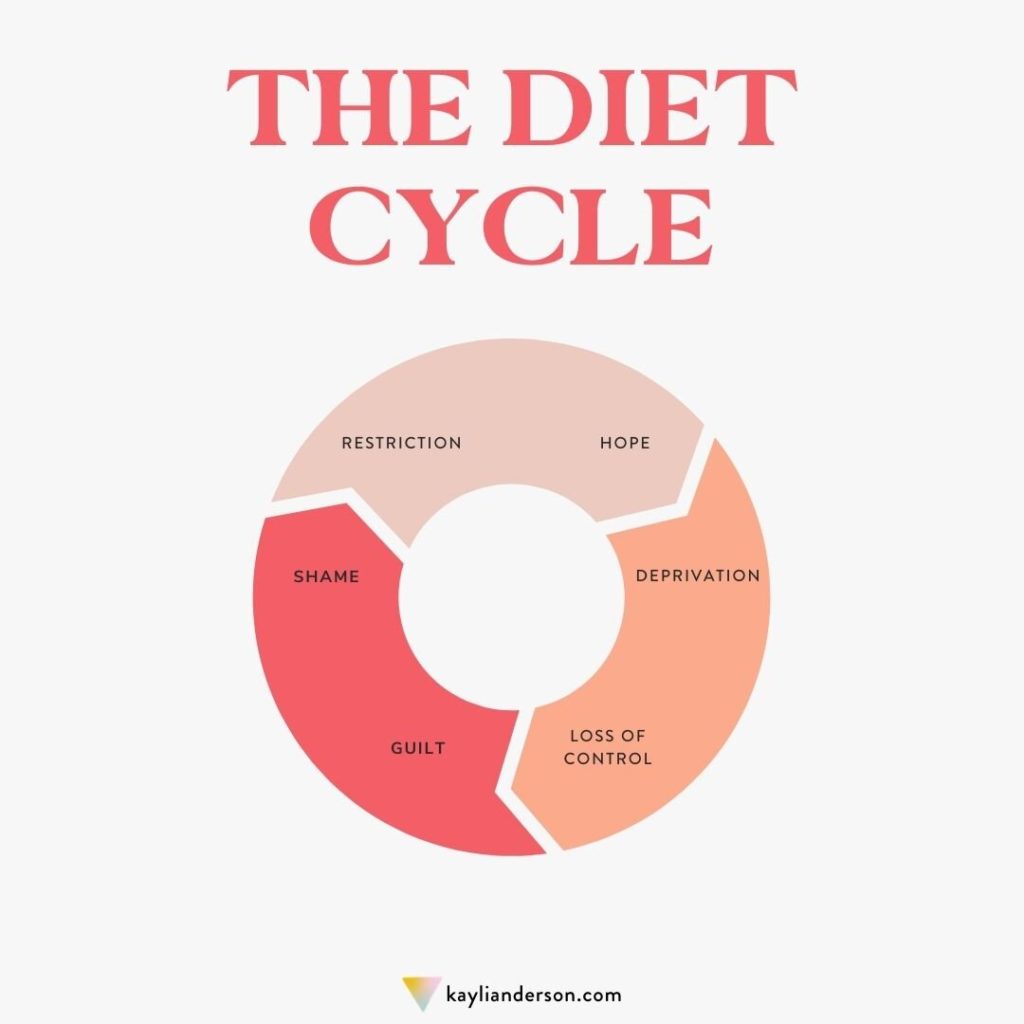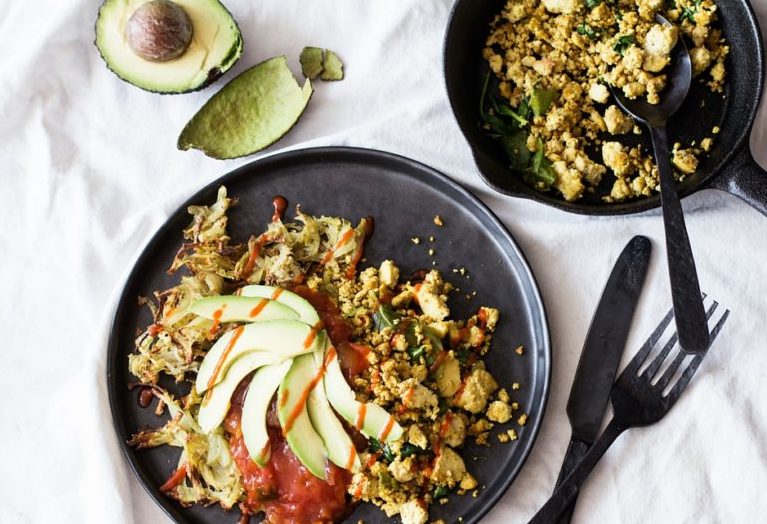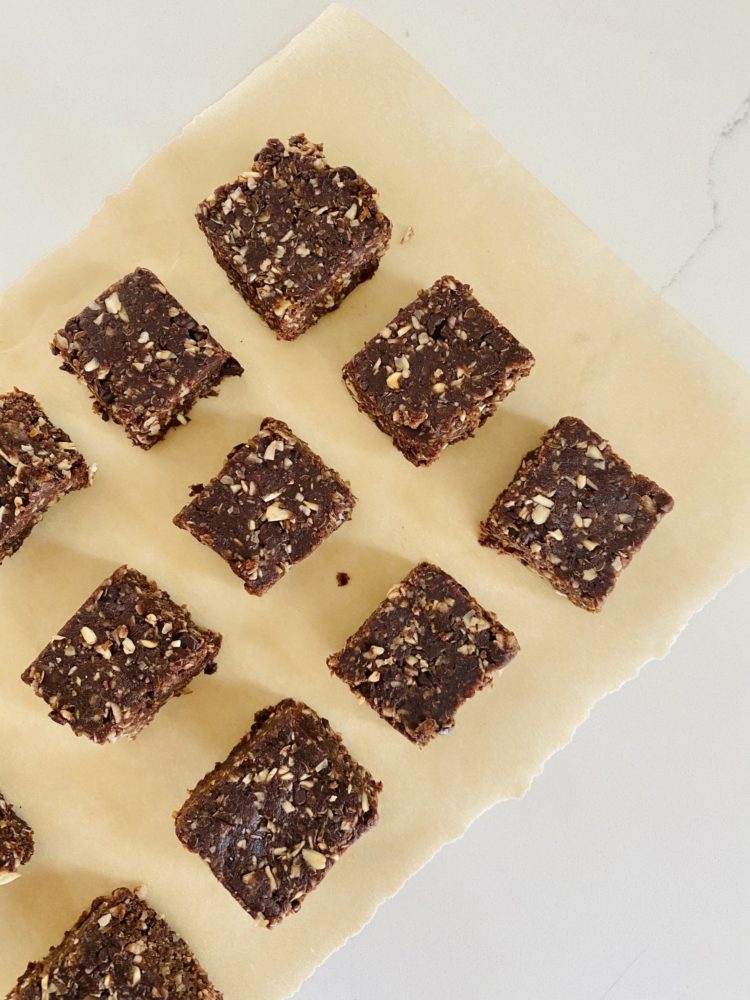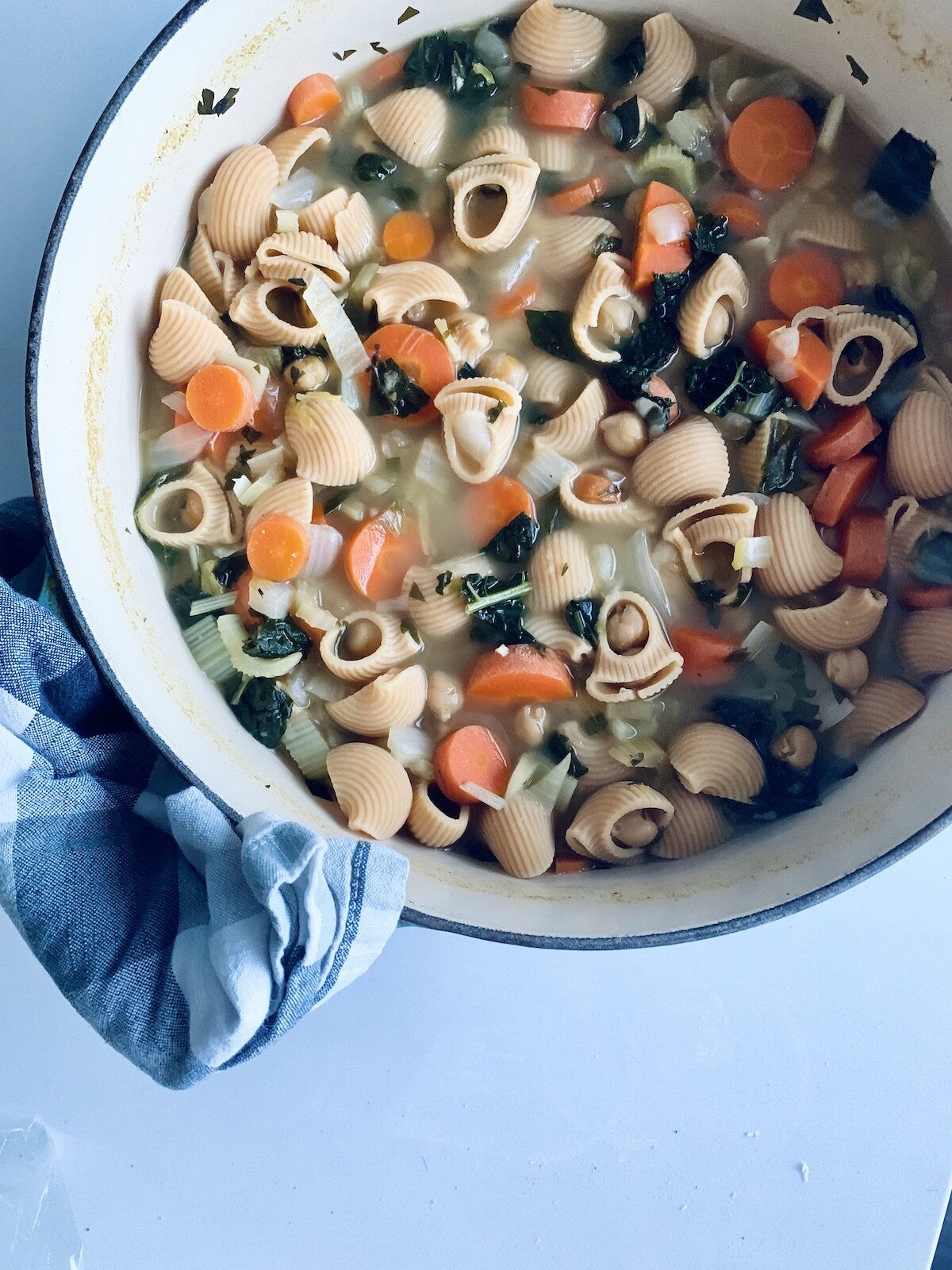If you have ever found yourself dieting to lose weight, then you’ve been caught in the diet cycle. It looks like this: attempting to follow a set of strict food rules, feeling deprived, feeling out of control and breaking the rules, feeling shame and guilt for “falling off the wagon”, and then punishing yourself by reinstating the strict (or even stricter) rules. If this is you, listen up: It’s not you, it’s them. And by “them” I mean the diet industry and the diet culture that they perpetuate. The weight loss industry is worth almost $279 BILLIONQ Yet, it’s also estimated that 95% of all diets fail.
Let’s talk about why dieting to lose weight doesn’t work and what to do instead of dieting to finally feel at peace with food and your body and free from struggling with your weight.

The Diet Cycle
If you’ve ever been on a diet, then you’ve found yourself spinning around in the Diet Cycle. Restriction and hope, followed by feelings of deprivation and loss of control around food, followed by guilt and shame.
It’s like a treadmill that you feel like you can’t step off of. You might go around and around with the same diet. Or you might swap in a new set of rules and restrictions. But you always seem to end up right back where you started. Each time it feels a little more disempowering, demoralizing, and humiliating. It chips away at your self-esteem. It makes you feel like there’s something wrong with you.
I’m going to tell you something that I bet on some level you already know to be true: dieting is a setup. Dieting is specifically designed to keep you coming back again and again and keep you blaming yourself each time you fail.
6 Reasons Why Dieting To Lose Weight Doesn’t Work
1. Weight loss diets are designed to be unsustainable
Part of the allure of diets are their clear rules and short-term timeframes. Every fad diet comes with a do’s and don’ts list, right? They also come with an enticing timeline – 30 day challenge, fast one week per month, etc. This is just enough time to make you buy the book, order all the products, and feel hopeful. Since you are going to eat about three meals a day for the rest of your life, you need something you can stick with for a lifetime – not just the next 30 days.
2. Diets rely on the wrong type of motivation
Many people believe that motivation is a talent – you either have it or you don’t. This isn’t necessarily true. Motivation is more like a skill. It’s something you have to build and strengthen, and the type you cultivate matters. Extrinsic motivation comes from something outside of ourselves – a reward, someone else’s approval, conforming to society’s definition of beauty, and even the avoidance of punishment or rejection. This is the type of motivation dieting relies on. Intrinsic motivation, on the other hand, comes from within us – doing something to achieve rewarding feelings like joy or pleasure, or doing something because it is connected to our core values. For example, exercising to reach a certain number on the scale is extrinsic. Exercising because it improves your mood is intrinsic. Extrinsic motivation can work in the short-term (the first few days and weeks of a diet), but its power is short-lived. For something to be truly sustainable, intrinsic motivation must be in play.
3. Your pleasure is missing from most diets
Have you ever felt guilty or embarrassed for loving to eat? I am giving you permission to drop those negative feelings right now because you are intelligently designed to enjoy food! Eating ensures your survival. Enjoying food helps us survive! In fact, studies show that we absorb more nutrition from a meal when we enjoy it. Your pleasure is literally part of your health equation. Most diets do not include pleasure. At best, they ignore it completely. At worst, they shame you for enjoying eating. Studies have shown that dieting perpetuates fixation and stress around eating – the opposite of what we want for optimal nourishment.
4. Diets harm your relationship with yourself
Dieting is based on a very patriarchal structure. You are given a set of rigid rules by an all-knowing diet and expected to comply. If you don’t, you are bad. This structure encourages you to outsource your power, ignore your innate wisdom about what is best for your body, and look to external sources to tell you how to do. It actively encourages you to distrust yourself and your body, framing your body as something that needs to be fixed or controlled. In research, dieting is associated with feelings of low self-esteem, social anxiety, and failure. Like most patriarchal structures, dieting ultimately severs the connection between your mind, body, and spirit.
5. Dieting to lose weight almost always leads to yo-yo dieting
The common outcome of dieting is repeatedly losing and regaining weight, called yo-yo dieting or weight cycling. Weight cycling is very detrimental to your health. It disrupts your hormones including those that regulate your hunger and satiety. It blunts your metabolism, increases inflammation, and puts you at higher risk for heart disease, high blood pressure, and insulin resistance. In a study of Biggest Loser contestants, the former contestants’ metabolisms were so blunted that on average they still only burned about 700 calories per day six years after the show! This is a very low number. For comparison, healthy adults need roughly 2,000 calories per day on average.
6. A diet doesn’t address the real reasons why you diet
Dieting to lose weight makes the promise that if you just eat *these* food and avoid *those* foods, you will get the body you want. But body shape, weight, and health are about SO much more than food. And the deeper reasons why people seek diets usually have nothing to do with just losing a few pounds. For instance, traumas experienced in childhood, called Adverse Childhood Experiences (ACEs), are a predictor of adult body weight. The more ACEs someone has experienced, the more likely they are to be categorized by the body mass index scale as obese. In other words, a fad diet is not the answer to the need to process traumas. You may also diet because you assign meaning to having a certain size body. Or because you think you need to fit into our society’s definition of a “good” body. It is the toxic messages in our culture that need fixing, not your body. Dieting is almost always a bandaid for deeper healing that needs to be done.
5 Things To Do Instead of Dieting To Lose Weight
Now that we know why diets don’t work, let’s talk about what you can do instead of dieting.
1. Start to create space in your mind
This might sound like an annoying first step, but hear me out. With every situation life presents, we have two choices – to either react or respond. The difference between reacting and responding is space in your mind. Imagine being totally consumed by a thought or situation. Then imagine yourself taking a giant step backward so there is more physical space between you and the situation. This is what space in your mind feels like. It gives you more space to take a wider view of the situation so you can observe and what’s happening internally and externally.
How do you create space in your mind? Mind space comes from reflective practices. Meditation, journaling, talk therapy, time in nature, or even just a simple deep breath all create space. Any activity that allows you to notice your thoughts, emotions, and behaviors before you react to them will work. You can then start to question why certain feelings are triggered by certain events. You can see how you’ve been reacting based on these feelings. And you can start to rewrite these patterns so you’re responding instead of reacting. Example: You are wrapped up in negative feelings about your weight. You take a deep breath before Googling “best weight loss diet”. With this new space in your mind, you realize that a photo on Instagram triggered the negative thoughts. Instead of Googling, you unfollow the account that triggered you.
In my decade of experience working with women to heal dieting struggles, this is the golden ticket to better health and a better life.
Try this:
Each day, set a timer for 5 minutes. Either write in a journal or record a voice memo about your day – how you felt, what came up for you, any high points, and any low points. Over time, start to notice any themes and patterns.
2. Learn to respect your body
The way that dieting keeps you in the Diet Cycle is by keeping you in the false belief that you body is flawed and needs to be fixed. The way you step out of the cycle is by learning to respect and trust your body. Have you ever thought about what a complete freaking miracle your body is? Have you thought about the incredibly slim odds that worked in your favor for you to be born? The fact that your heart has been beating on its own since you were in the womb? That you can sleep, work, and juggle a million thoughts in your mind while your body keeps remembering to breathe? I could go on and on. You are a miracle! So, regardless of whether you like the look of your body, I want you to start thinking about respecting your body. Learning to respect your body leads you back to the innate desire to want to care for your body. And the desire to care for your body leads you to make decisions in your life that benefit your health. Now that is intrinsic motivation!
Try this:
Every morning or evening, come up with 1-3 things that you appreciate about your body. Write them down or say them aloud to yourself. Read more about how to appreciate your body just as it is in this post.
3. Use your self-care filter
Just because diets don’t work doesn’t mean that nutrition doesn’t work. We know the research-backed basics of good nutrition (find evidence-based nutrition guidance here). The key to approaching these practices is replacing your diet mentality with a self-care filter. Good nutrition should feel like self-care, not self-control. When you encounter a nutrition practice, ask yourself, will this practice feel like self-care? This ensures that any new food habit you adopt is there to serve your highest purpose, caring for yourself.
Try this:
Reflect on your personal definition of self-care. What things feel like self-care to you? Examples include going to bed early, time in nature, sticking with your daily meditation practice, or drinking enough water. What do those things feel like before, during, and after you do them? Write down your definition so that your self-care filter feels really clear to you.
4. Find meaningful ways to measure your health
When you’re dieting to lose weight, most diets measure your “success” with the number on the scale, calories or macros, or how well you followed their rigid rules. The truth is that none of these metrics are good indicators of your health (topics for another day!). I want to invite you to measure your health by more meaningful metrics. If you are focused on a certain health condition, then track your lab metrics like your cholesterol. If your goal is simply to feel better, track how you feel. Energized, balanced, peaceful. Other ideas: the quality of your sleep, the reduction of obsessive thoughts about food, or how present you felt during meals.
Try this:
Choose one meaningful metric and track it every week.
5. Let your satisfaction be your guide
I am a Certified Intuitive Eating Counselor (if you’re curious about intuitive eating, start here), and satisfaction is the hub of intuitive eating. Your satisfaction includes your pleasure and enjoyment, but it also includes how you feel in your body, your health, and how aligned your life is with your values. So, when you let satisfaction guide your eating decisions, you make choices around food that balance all of these aspects. You may turn down a glass of wine because part of your satisfaction is high-quality sleep. Or you may say yes to an ice cream cone because sharing a child-like experience with a close friend is aligned with your core value of nurturing important relationships. Or you may say no to a burger and fries and yes to a salad because you know the salad will feel better and more energizing in your body that particular day. Satisfaction is personal, multifaceted, and ever-changing, but it is a trustworthy guide.
Try this:
After each meal, rate your satisfaction on a scale of 1-10. Notice patterns with experiences that feel satisfying vs. those that don’t. Through these patterns, your personal definition of satisfaction will begin to emerge.
The Top Weight-loss Myths – Busted!
Are you falling for these top plant-based weight-loss myths? Download my Plant-based Weight-loss Myths Guide to find out the truth!


